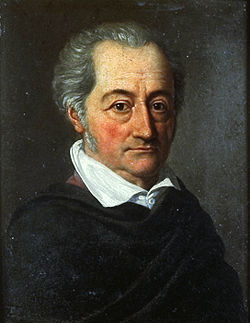Johann Wolfgang von Goethe
 From Citizendium - Reading time: 3 min
From Citizendium - Reading time: 3 min

Johann Wolfgang von Goethe (August 28, 1749 - 22 March 1832), often referred to simply as Goethe, was a German writer and poet. He is still considered the greatest of all German writers. He is best known for his magnum opus, the two-part drama Faust.
Goethe was one of the leading figures in German literary movements of the later 18th and early 19th centuries, including German or Weimar Classicism which overlapped with Sturm und Drang and Romanticism.
Early life[edit]
Goethe was born August 28, 1749 in Frankfurt, which at the time was an Imperial Free city in the Holy Roman Empire. He was the son of Johann Caspar Goethe (1710-1782) and Catharina Elisabeth Textor (1731-1808), who was the daughter of the mayor of Frankfurt. He was educated privately, learning Latin, Greek, French, and English in addition to all other common subjects of that time. He was attracted to drawing and literature at a young age.
He was formally educated in law, at first in Leipzig (1765-1768), and then, after a long illness and convalescence spent at home in Frankfurt, finally in Strasbourg. But his heart was not in the law and after he became acquainted with Johann Gottfried (von) Herder he started to develop his ideas for a new German literature. One of his major influences was the English playwright William Shakespeare.
His first literary endeavor was the successful 1773 drama Götz von Berlichingen based on the memoirs of a noble adventurer and poet from the German Peasants' War. Though forced to supplement his income with a legal practice, he continued to grow as a writer and poet. In 1774, he published the book that made him famous throughout Europe, The Sorrows of Young Werther (Die Leiden des jungen Werther).
Bibliography[edit]
Works by Goethe[edit]
- 1771: "Heidenröslein" ("Heath Rosebud"), poem
- 1773: "Prometheus", poem
- 1773: Götz von Berlichingen, drama
- 1774: The Sorrows of Young Werther (Die Leiden des jungen Werther), novel
- 1774: "Der König in Thule", poem
- 1775: Stella, tragedy in five acts
- 1782: "Der Erlkönig" ("The Alder King"), poem
- 1787: Iphigenie auf Tauris (Iphigenia in Tauris), drama
- 1786: Novella, novella
- 1788: Egmont, drama
- 1790: Versuch die Metamorphose der Pflanzen zu erklären (The Metamorphosis of Plants), scientific text
- 1790: Torquato Tasso, drama
- 1790: Römische Elegien (Roman Elegies), poetry collection
- 1793: Die Belagerung von Mainz, (The Siege of Mainz), non-fiction
- 1794: Reineke Fuchs, fable
- 1795: Das Märchen (The Green Snake and the Beautiful Lily), fairy-tale
- 1794–95: Unterhaltungen deutscher Ausgewanderten, novella, which also includes the fairy tale Das Märchen
- 1795–96 (with Friedrich Schiller): Die Xenien (The Xenia), collection of epigrams
- 1796: Wilhelm Meisters Lehrjahre (Wilhelm Meister's Apprenticeship), novel
- 1797: "Der Zauberlehrling" (The Sorcerer's Apprentice), poem
- 1798: Hermann und Dorothea (Hermann and Dorothea), epic poem
- 1798: Die Weissagungen des Bakis (The Soothsayings of Bakis)
- 1798/01: Propyläen, periodical
- 1803: Die Natürliche Tochter (The Natural Daughter), play
- 1805: "Winkelmann und sein Jahrhundert" ("Winklemann and His Century")
- 1808: Faust (Part One), drama
- 1809: Die Wahlverwandtschaften (Elective Affinities), novel
- 1810: Zur Farbenlehre (Theory of Colours), scientific text
- 1811–1830: Aus Meinem Leben: Dichtung und Wahrheit (Out of my Life: Poetry and Truth) autobiographical work in 4 volumes
- 1813: "Gefunden" ("Found"), a poem
- 1817: Italienische Reise (Italian Journey), journals
- 1819: Westöstlicher Diwan, collection of poems
- 1821: Wilhelm Meisters Wanderjahre, oder Die Entsagenden (Wilhelm Meister's Journeyman Years), novel
- 1823: "Marienbad Elegy", poem
- 1832: Faust (Part Two), drama
- 1832/33: Nachgelassene Schriften (Posthumous Works)
- 1836: Gespräche mit Goethe (Conversations with Goethe) also translated as: Conversations with Eckermann
Studies of Goethe[edit]
- Boerner, Peter. Goethe. London: Haus, 2005. ISBN 1904341640
- Wagner, Irmgard. Goethe. New York: Twayne Publishers, 1999. ISBN 0805716858
- Williams, John R. The Life of Goethe: A Critical Biography. Oxford (UK), Malden (MA): Blackwell, 1998. ISBN 063116376X
A famous short lyrical poem[edit]
A short lyrical poem by Goethe (Über allen Gipfeln) is considered one of the best poems ever written in German. Because Goethe's poem is lyrical and includes both rhyming and alliteration, it loses much in translation. It is shown here in German and English:
Über allen Gipfeln
Ist Ruh,
In allen Wipfeln
Spürest du
Kaum einen Hauch;
Die Vögelein schweigen im Walde.
Warte nur, balde
Ruhest du auch.
O'er all the hilltops
Is quiet now,
In all the treetops
Hearest thou
Hardly a breath;
The birds are asleep in the trees:
Wait, soon like these
Thou too shalt rest. (H. W. Longfellow, translator)
It was set to music by Schubert.
 KSF
KSF